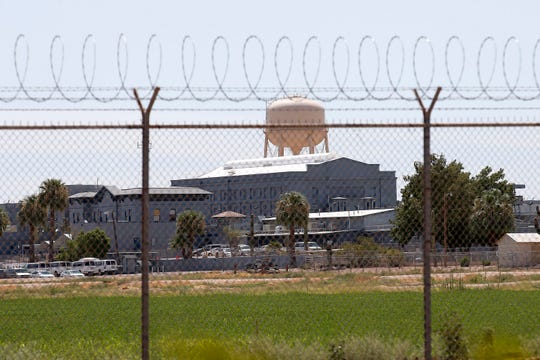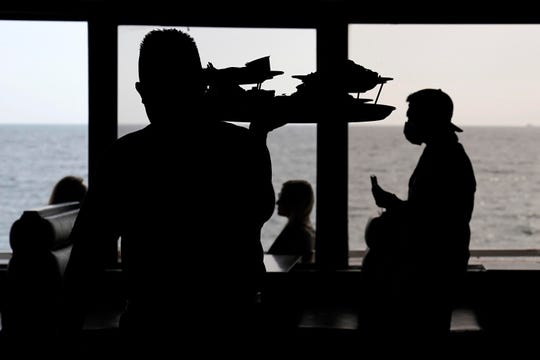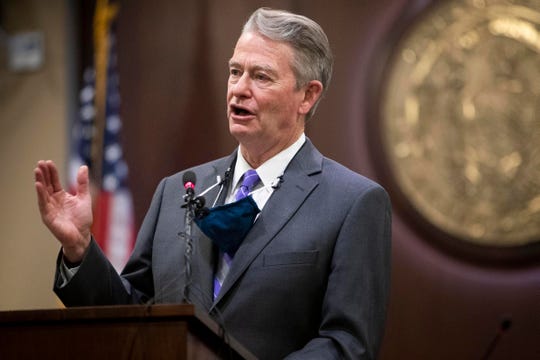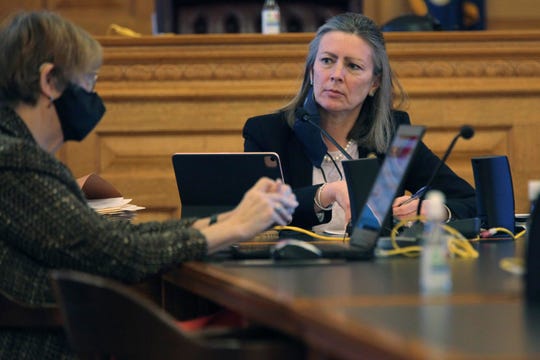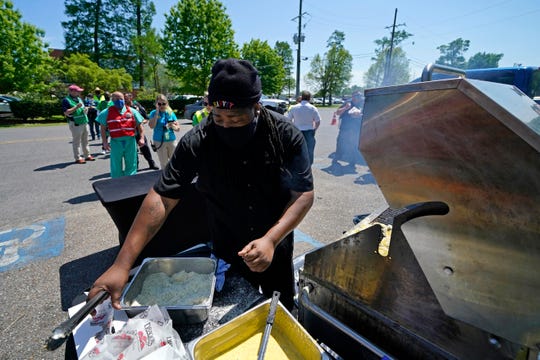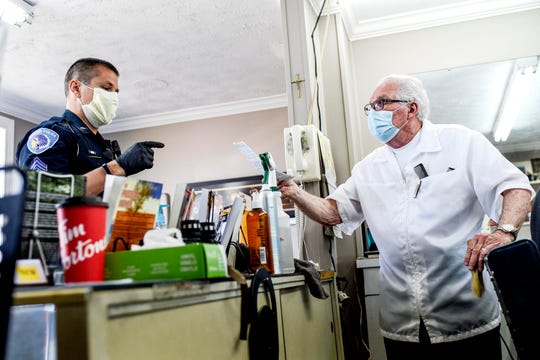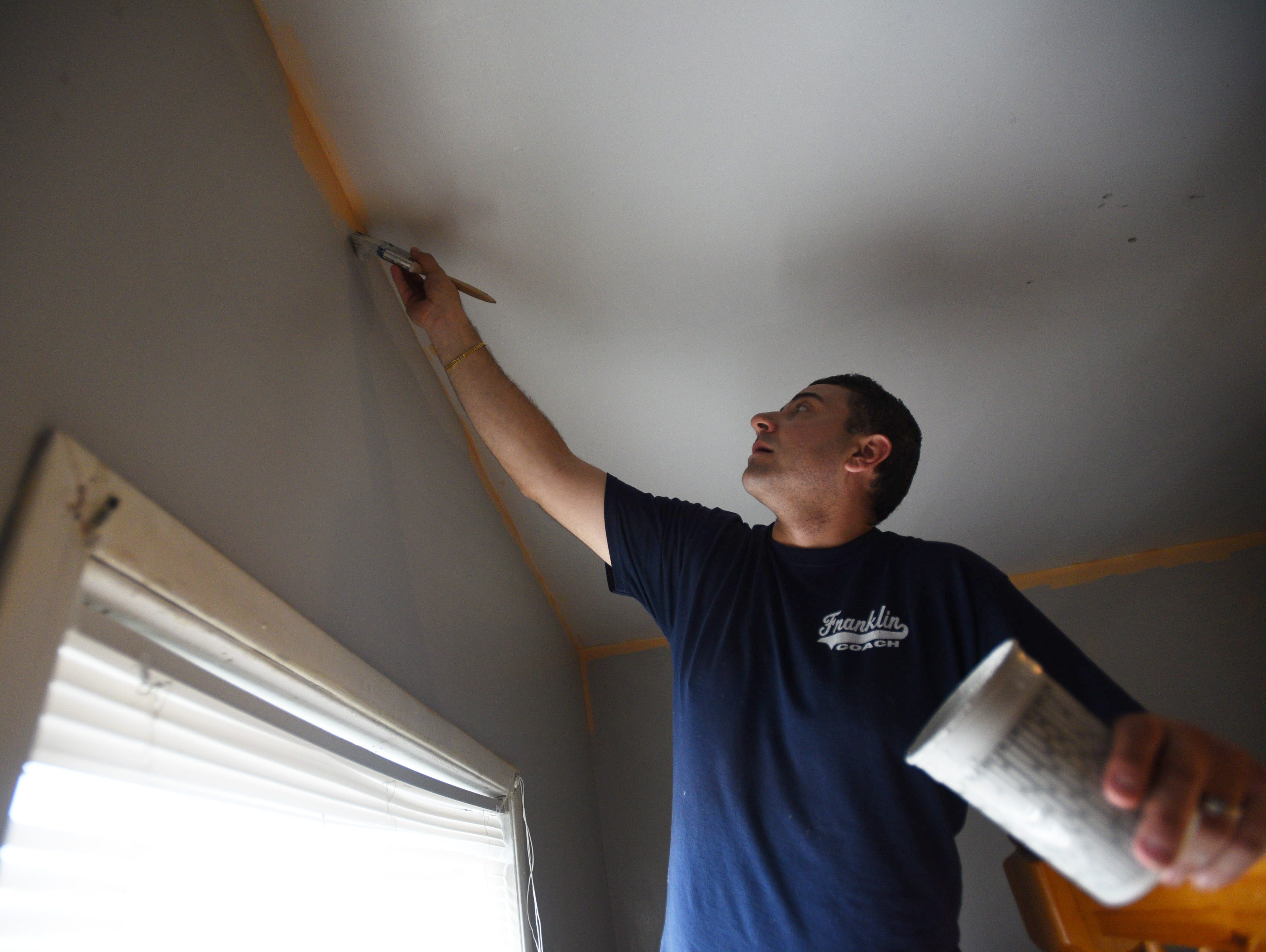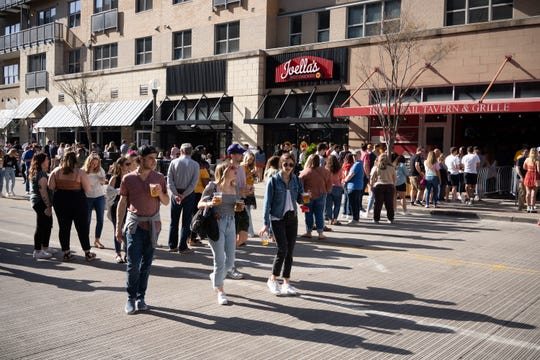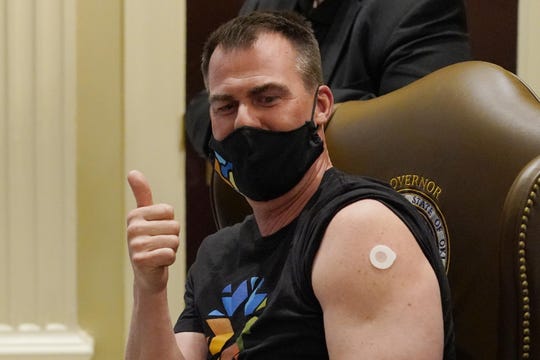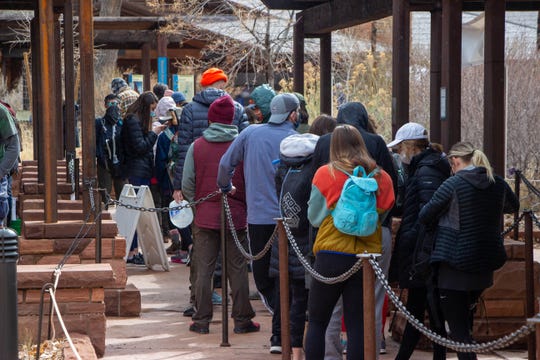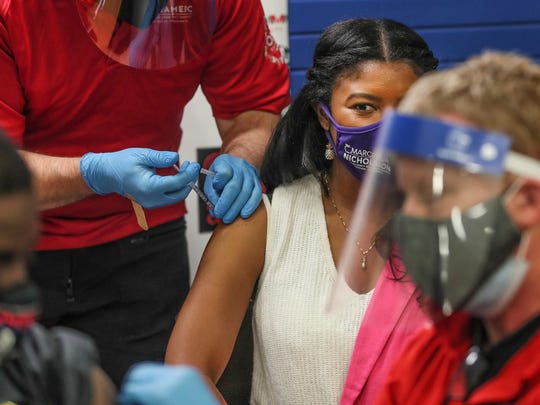Chef initiative, ice fishing trash, Tribeca plans: News from around our 50 states
Alabama
Montgomery: A spokeswoman for Gov. Kay Ivey said Monday that the state’s mask mandate will end April 9 despite the president’s request for states to reinstate or maintain restrictions. “We have made progress, and we are moving towards personal responsibility and common sense, not endless government mandates,” Ivey spokeswoman Gina Maiola said in a statement. President Joe Biden and a top health official on Monday appealed for mask requirements and other restrictions to be maintained or restored to stave off a “fourth surge” of COVID-19. Alabama has kept a mask mandate in place longer than surrounding states, but Ivey has made clear it will not be extended past the end of next week. The Republican governor has urged Alabamians to keep wearing face coverings as a matter of personal responsibility. “After April 9, masks will no longer be a mandate, but they remain one of the most successful tools we have to keep folks safe from COVID-19,” Ivey said last week. Her office released sign templates that businesses could use to request that their patrons wear masks.
Alaska
Anchorage: Eight youths from the state have developed a serious inflammatory syndrome from previous coronavirus infections, health officials said in a report. The report released Friday said some of the eight children ended up in the pediatric intensive care unit with severe complications. The condition they developed is called multisystem inflammatory syndrome in children. MIS-C can lead to inflamed organs, including the heart, lungs, kidneys and brain, according to the U.S. Centers for Disease Control and Prevention. Since May 2020, the CDC has reported 2,617 cases of the syndrome and 33 deaths from MIS-C across the nation. Most cases were in children and adolescents between ages 1 and 14, with the median age being 9. Cases have occurred in children and adolescents less than 1 year old and up to 20. About 66% of the reported cases have occurred in children who are Hispanic, Latino or Black – a total of 1,586 cases, according to the CDC. Roughly 99% of those who developed the syndrome had previously tested positive for the coronavirus. The remaining 1% were around someone who had the virus, the CDC said. “This happens to kids after COVID,” said Dr. Benjamin Westley, an infectious disease specialist who treated six of the eight Alaska minors and contributed to the report.
Arizona
A state prison in Florence, Ariz. State corrections officials are citing the demands of the pandemic in trying to fend off a contempt-of-court fine for failing to follow through on promises to improve health care for inmates. (Photo: AP)
Phoenix: Corrections officials cited staffing and resource demands of the pandemic in trying to fend off a contempt-of-court fine against the state that could reach as high as $17 million for failing to follow through on promises in a legal settlement to improve health care for inmates. Lawyers for corrections officials said in a court filing Friday that the pandemic forced people working in prisons to take on more duties, caused infection employees to miss work and required resources to be spent on trying to guard against the coronavirus. They said the focus on protecting prisoners and staff members from the virus came at the expense of compliance with the 6-year-old settlement. While acknowledging their clients’ noncompliance on many provisions of the settlement, the lawyers said corrections officials still made their best efforts to comply in a challenging situation. Compliance declined during periods when the state experienced spikes, when mass testing was done inside prisons and when providing care to inmates with the virus, the attorneys said. The state has already been the subject of two contempt fines totaling $2.5 million for noncompliance with the settlement. U.S. District Judge Roslyn Silver, who had threatened the third round of fines, has warned the state against offering any of its past excuses for noncompliance. In an order earlier this month, Silver wrote that coronavirus restrictions may provide a valid basis for noncompliance but emphasized that the virus can’t be used as a complete shield.
Arkansas
Little Rock: The state will open up COVID-19 vaccinations to anyone 16 and older and is dropping its mask mandate immediately, Gov. Asa Hutchinson announced Tuesday. The Republican governor announced the moves as Arkansas saw its coronavirus cases and hospitalizations continue to decline. The state had previously made the vaccine available to people 65 and older as well as several other categories, including teachers, health care workers and food service employees. Hutchinson last month lifted most of the state’s virus restrictions, including restaurant and bar capacity limits, and had said the mask mandate would expire at the end of March if the state met goals for test positivity and hospitalizations. Hutchinson is lifting the mask mandate despite President Joe Biden urging states to reinstate or maintain such restrictions to stave off another surge of the virus. “Last year, the urgent COVID message was ‘wear a mask,’ ” Hutchinson said Saturday in a tweet. “Masks remain important, but today’s urgent message is ‘get vaccinated’ … but if we are going to win, we must increase the count. Roll up your sleeve for Arkansas!”
California
Wait staff walk through an empty dining room as customers eat outside in front of beach views at Gladstones restaurant in the Pacific Palisades section of Los Angeles on March 14. (Photo: Mark J. Terrill/AP)
Los Angeles: Massive Los Angeles County can reopen even more businesses – including outdoor bars that don’t serve food – while expanding how many people are allowed to dine indoors and catch a movie, but it won’t do so until next week, officials said Tuesday. The county of 10 million people was one of several, including neighboring Orange, that moved into the state’s second-least-restrictive orange tier amid low coronavirus case rates and increased vaccinations. Half of the state’s population is now in that tier, where the virus rates are “moderate.” The new rules allow for expanded activities the following day, but counties can opt to maintain more restrictions. LA County’s public health director, Dr. Barbara Ferrer, said Tuesday that reopenings and expansions will go into effect Monday, as she wanted to take a more cautious approach given the mix of new variants of the virus. The county, home to a quarter of California’s residents, was reporting well over 10,000 new cases and a couple hundred deaths a day during the winter surge. On Tuesday, Ferrer reported 26 additional deaths and 386 new cases as she implored people to continue wearing masks. “If we wish to maintain these low numbers, it will be essential that each of us not get sloppy,” she said.
Colorado
Denver: Students will only take one state standardized test this year in either math or English following a year of challenges caused by the coronavirus pandemic. The federal government has approved a request from Colorado that allows students in fourth, sixth and eighth grades to take the math assessment and students in third, fifth and seventh grades to take the English or language arts assessment, Colorado Public Radio reports. Parents can choose to have their child take both tests, which are intended to measure students’ academic progress at the end of each year in multiple subjects. “This is the answer we’ve been waiting for,” said Democratic state Sen. Rachel Zenzinger, who sponsored the waiver bill. “I appreciate the quick response from the federal government that will allow our schools to plan and prepare.” State officials made the request to give students, parents and educators some relief after a year both in and out of the classroom during the pandemic. The tests this year won’t be used to evaluate teacher performance or rate schools, but officials hope the results will help evaluate the effects of the pandemic. Parents and teachers have argued that students’ learning and mental health must take priority over standardized tests during the pandemic.
Connecticut
Hartford: With everyone age 16 and older eligible Thursday to begin signing up for COVID-19 vaccination appointments, Gov. Ned Lamont announced Monday that people with certain medical conditions that put that put them at high risk, including people with intellectual disabilities, will have “priority access” for shots. Some hospitals are planning to hold dedicated vaccine clinics, and others are reaching out to patients with reserved appointments, while some patients will likely get vaccinated during their normal medical appointments at the hospital, said Josh Geballe, Lamont’s chief operating officer, who expects the group will include about 10,000 people. The list of conditions includes sickle cell disease, end-stage renal disease on dialysis, active cancer treatment and solid organ transplant. “These are the conditions that the chief medical officers at the hospitals felt were most worthy of prioritization,” Geballe said. He urged families to hold off on signing up their older teens in the early days of this final phase of the rollout. “I think if you’re the parent of an older teenager, about 16, or if you’re in your 20s, you’re perfectly healthy, please give it a week. You’re going to get in your turn very soon. But let’s let people in their 40s or people in these other conditions get appointments first,” he said. “That’s good advice.”
Delaware
Wilmington: The state is easing restrictions on outdoor gatherings starting Thursday and will make all residents 16 and older eligible for a COVID-19 vaccine next Tuesday. The loosened gathering limits will allow up to 150 people at certain venues for events including weddings, funerals, sporting events and concerts. It’s the second set of changes Delaware has made this year to loosen restrictions, but many are still in place, including a public mask mandate and a 10-person limit for private indoor gatherings. In a statement, Gov. John Carney said the state is comfortable easing some outdoor restrictions because the coronavirus is less likely to spread outdoors, especially in warm weather. Under the revisions, the state can also issue an additional 1,000 surf fishing tags for the 2021 season. But restaurants, retail locations, gyms, houses of worship, arts venues and other businesses remain limited to the lesser of 50% of their stated fire capacity or 25 people. Almost 1 in 3 Delawareans have received at least one dose of a COVID-19 vaccine, with 15.7% of the population fully vaccinated, according to federal data. Coronavirus cases have started increasing again in the state and throughout the region. In the past two weeks, the seven-day average for new cases in Delaware has increased by 44% to 284.6.
District of Columbia
Portrait of Kevin Tien, as seen on Iron Chef Gauntlet, Season 2. (Photo: Jace Downs for Food Network)
Washington: A coalition of chefs in D.C. is stepping up to spread awareness and raise money to end anti-Asian racism, WUSA-TV reports. Chefs Stopping AAPI Hate is launching a series of dining experiences throughout April to get people talking about violence against the Asian American community that’s widely seen as being amplified by the coronavirus pandemic. “A lot of people are trying to fight for what’s right,” said chef Kevin Tien, a co-organizer with Chefs Stopping AAPI Hate. He said he’s sick of seeing attacks on Asian people in America but turning that sadness and anger into action with the monthlong takeout dinner series to fight racism. “I always cook whenever I’m having times of self-doubt or trouble,” said Tien, who is partnering with 45 chefs in the area to prepare five-course to-go meals every Sunday in April. Tien is Vietnamese-American and said, culturally, many elders within his community chose to ignore and stay silent on racism against them for years. The xenophobia is now amplified, many believe, because of rhetoric related to where the virus first took hold. Mayor Muriel Bowser’s administration announced it is donating $10,000 to support the effort. Others in the area can back what the group is doing by ordering meals online from Chefs Stopping AAPI Hate.
Florida
Tallahassee: Gov. Ron DeSantis said Monday that he would issue an executive order forbidding local governments and businesses from requiring so-called vaccine passports to show proof that customers have been inoculated against COVID-19. He made the announcement during a ceremony he convened at the state Capitol to sign into law a bill approved by the Legislature on Friday that would bar coronavirus-related lawsuits against businesses that have made good-faith efforts to comply with guidelines meant to stop the spread of the virus. A plaintiff would also need a signed affidavit from a doctor stating with reasonable certainty that injury or death caused by COVID-19 was a result of the defendant’s actions. “We don’t want to be in a situation where people are scared of being sued just for doing normal things,” the Republican governor said. DeSantis had a live band playing a cover version of the Beatles’ “With a Little Help from My Friends” in the Cabinet meeting room before he signed the bill. Of the order to bar businesses from refusing to serve people who can’t prove they have been vaccinated, he called it “completely unacceptable for either the government or the private sector to impose upon you the requirement that you show proof of vaccine to just simply participate in normal society.”
Georgia
Atlanta: Diners could permanently get mixed alcoholic drinks to go when ordering food under a measure that passed the General Assembly on Monday. The House voted 120-48 for the bill, sending it to Gov. Brian Kemp. Georgia lawmakers already agreed to allow restaurants to sell takeout beer or wine. Rep. Kasey Carpenter, R-Dalton, who owns a restaurant, said the measure is needed to reflect a change in dining habits spurred by the coronavirus pandemic. “Moving forward, Georgians will eat out differently,” said Carpenter, who said his business does not sell mixed drinks. “This bill seeks to give our industry the flexibility to address those needs.” The drinks would have to be packaged in tamper-proof containers with no straw holes and would have to be transported in a vehicle’s trunk, in a glove compartment or behind the last seats. Only two drinks per entree could be ordered. Local governments could still prohibit such sales, but they would be legal if a city or county does not act. The measure would take effect as soon as the governor signs it. The Distilled Spirits Council, which lobbies for alcohol makers, says to-go cocktails are currently allowed in more than 30 states.
Hawaii
Honolulu: A recent surge of tourists has driven up the price of rental cars after fleets were thinned out during the pandemic. Some companies in Honolulu have recently had only large vans for $500 a day and convertibles for $1,000 a day or more, Hawaii News Now reports. Timo Lee, a part-time Honolulu resident, said some vendors she checked with were “completely out of stock.” The pandemic resulted in limited inventory, which meant rental companies “had to get rid of them,” said Jerry Agrusa, a professor in the School of Travel Industry Management at the University of Hawaii. “They had to sell them.” Uncertainty about when tourism would return is another factor for the high prices, he said. Like Oahu, Maui has also seen a recent surge in COVID-19 cases, and the island’s mayor is warning visitors to follow local mandates. “You see these people on the beach back here – they’re visitors, and they’re not wearing masks,” Mayor Mike Victorino said. “If you can’t obey our rules, don’t come if you can’t wear a mask or do what is right.” The mayor said he is considering more options to help curb the spread of COVID-19, including a post-travel coronavirus test for all travelers and tighter local restrictions.
Idaho
Idaho Gov. Brad Little speaks during a press conference at the Statehouse in Boise, Idaho. (Photo: Darin Oswald/Idaho Statesman via AP)
Boise: Gov. Brad Little has issued his first veto of the 2021 legislative session, refusing to sign a bill involving the responsibilities of the chairman of the Idaho State Tax Commission. Following Friday’s veto, the Republican governor said the legislation would add red tape that goes against his core belief of good government. “The legislation adds a burdensome level of bureaucracy and uncertainty, which I fear will only complicate and slow the Tax Commission’s ability to accomplish its important mission,” Little wrote in his veto letter. “In the last year, we witnessed firsthand during the pandemic the incredible ability of the Tax Commission staff to step up and adapt quickly in changing environments to successfully implement initiatives and programs that support Idaho citizens and businesses.” The Legislature is recessed until April 6 due to a COVID-19 outbreak among lawmakers in the House. Last year, as the coronavirus pandemic took hold, Little signed a proclamation extending the tax filing deadline from April 15 to June 15. The commission also played a role in many other financial areas, including handling applications for small businesses so they could receive federal coronavirus emergency funding.
Illinois
Chicago: A hospital CEO has been suspended for two weeks following a series of COVID-19 vaccination events involving alleged favoritism, including one in which ineligible Trump Tower workers were vaccinated. The unpaid suspension of Loretto Hospital’s president and CEO, George Miller, is on hold until the hospital finds a new chief operating officer and chief financial officer, a hospital spokeswoman said late Monday. Dr. Anosh Ahmed, who had been Loretto’s COO and CFO, resigned last week, days after he and Miller were reprimanded by the board of directors following news reports that hospital executives provided vaccines to some people who weren’t yet eligible. Loretto Hospital is located on Chicago’s West Side and largely serves Black and Latino people. It was chosen last year to administer the city’s ceremonial first COVID-19 vaccination as part of efforts to encourage residents in West Side neighborhoods to get vaccinated. Mayor Lori Lightfoot said Monday that Loretto is a “safety net hospital” that is pivotal to Chicago and that she is “committed to helping Loretto get it right because they’re so important to the West Side community.” She said it was clear that officials “deviated from what I think is their core mission and what should have been the focus during this critical time period.”
Indiana
South Bend: University of Notre Dame officials say they will be able to vaccinate all students on campus by the end of the spring semester. The school will receive enough Pfizer COVID-19 vaccine for every student to be fully inoculated with both doses before the end of May, the university’s president, the Rev. John Jenkins, said in a letter to students, faculty and staff Thursday night. A vaccination clinic is anticipated to open by mid-April, but students are only being encouraged – not required – to receive the shots. “Needless to say, we are delighted to receive this positive news,” Jenkins said, noting that Notre Dame will continue enforcing its current campus health and safety protocols. The Notre Dame vaccination clinic will also have shots available for faculty and staff, he said, although university officials have asked non-students to first seek out vaccine at local community sites. The announcement follows Gov. Eric Holcomb’s confirmation in a statewide address last week that all Hoosiers ages 16 and up will qualify for the vaccine starting Thursday. The Republican governor said he would also lift the statewide mask mandate and remaining COVID-19 business restrictions next Tuesday.
Iowa
Des Moines: A week before Gov. Kim Reynolds officially makes all adults eligible for COVID-19 vaccinations, public health officials acknowledged Monday that some counties have already started providing the shots to anyone over age 16. In northwest Iowa’s Humboldt County, for example, public health officials announced they would hold mass vaccination clinics Wednesday and Thursday for anyone 16 and up. Public health officials said they have 650 doses of the Pfizer vaccine available. Appointments were required and confirmed on a first-come-first-served basis for the clinics to be held at the county fairgrounds. Reynolds has said she anticipates opening up availability to all adults Monday as national supplies and the allocation of doses to states increase. As of Monday, Iowa was eighth in the nation for the percentage of the entire population fully vaccinated at 19%. Nationally, 15.8% of the U.S. population is vaccinated. Iowa, like many states, is seeing a recent increase in coronavirus activity. The state on Monday reported 110 new confirmed cases and seven additional deaths. The seven-day rate of positive coronavirus tests increased to 4.7%. State public health officials reported 196 people in hospitals and 44 COVID-19 patients in intensive care units.
Kansas
Kansas Senate Judiciary Committee Chair Kellie Warren, R-Leawood, follows a discussion during a meeting Monday at the Statehouse in Topeka. The committee is considering a proposal to set up state and local funds using federal COVID-19 relief dollars to pay businesses harmed by pandemic restrictions. (Photo: John Hanna/AP)
Topeka: Legislators are working on a plan for setting aside potentially several hundred million dollars in federal COVID-19 relief funds to pay businesses harmed by state and local restrictions imposed last year to check the coronavirus’ spread. The state Senate Judiciary Committee is considering a proposal to set up a fund to pay claims from businesses that either were shut down or had their operations curtailed by state restrictions. The measure also would require counties and cities that imposed restrictions to set up similar funds. The state, cities and counties would be required to set aside 25% of their federal COVID-19 relief funds that aren’t dedicated to a specific purpose. The committee had hoped to vote on the proposal Monday, but Chair Kellie Warren, R-Leawood, said lawmakers and interested parties were still trying to hash out some details. The measure is designed to end the threat that the state, counties and cities could face a larger total payout from lawsuits from business owners. A Wichita fitness studio’s owner and his business sued the state in December, and his attorneys and Attorney General Derek Schmidt agreed to put the lawsuit on hold to allow lawmakers to consider a plan for compensating businesses.
Kentucky
Louisville: The mass vaccination site at Cardinal Stadium, set to open April 12, will start accepting appointments for everyone 16 and older Wednesday. The site, which will include 24 lanes in the parking lots outside the stadium, has set a goal of inoculating at least 4,000 people a day through May 28 – 200,000 total. Dr. Jason Smith, chief medical officer for University of Louisville Health, said Tuesday that he hopes the site can administer 24,000 vaccines in its first week. U of L Health is providing fourth-year medical students, nurses and physicians to run the site, as well as “a huge pool of volunteers that are willing to help out,” Smith said. There will also be an AmeriCorps presence and a National Guard presence to help with traffic. Smith said the site will have the Pfizer vaccine and, later, the Johnson & Johnson one-dose version. People can sign up at UofLHealth.org or call 502-681-1435 starting Wednesday. Meanwhile, the University of Kentucky has also announced an expansion of its vaccine and coronavirus testing services to new locations around the state.
Louisiana
Ryan “Kool Aid” Hurst, of Drago’s Restaurant, serves chargrilled oysters to health care workers Monday at “Vaccine Fest,” a 24-hour mass COVID-19 vaccination event in Metairie, La., just outside New Orleans, hosted by Ochsner Health System and the Jefferson Parish Government. Every adult over age 16 is now eligible to get vaccinated as Louisiana’s expanded eligibility went into effect Monday. (Photo: Gerald Herbert/AP)
Baton Rouge: The state will end many of its coronavirus restrictions for businesses but will keep its mask mandate in place, Gov. John Bel Edwards announced Tuesday. Customer limits on bars, restaurants, salons, gyms, malls, casinos and other nonessential businesses will be removed, though they’ll be required to use social distancing. They had previously been capped at 50% or 75% of their occupancy limits. Direct table service still will be required at bars, but an 11 p.m. alcohol curfew will end. The changes mean businesses face the fewest restrictions since the pandemic began. The new rules start Wednesday, though local officials could choose to enact tougher limits than those put in place by the Democratic governor. “Today marks a big step forward, but we’re all going to have a role to play,” Edwards said. He urged people to continue to “mask, vaccinate and distance.” But the lightened limits diverge from some of the recommendations of President Joe Biden’s administration, which has urged restrictions to be maintained or tightened to avoid another surge of COVID-19. Edwards said he won’t loosen the rules for face coverings, which have been in place since July, arguing that mask-wearing is among the most effective ways to lessen the spread of COVID-19.
Maine
Augusta: The Augusta Civic Center is slated to pull double duty this week as the host of the Legislature and a COVID-19 vaccination clinic. The Legislature, which has been using the civic center to facilitate easier social distancing, was slated to convene at the venue Tuesday and expected to take up the biennial budget proposal. MaineGeneral Medical Center was also scheduled to hold a continuing vaccination clinic at the facility. Maine Senate President Troy Jackson of Allagash and Chuck Hays, president and chief executive officer of MaineGeneral Health, said they were confident the civic center could accommodate the two events simultaneously. “We’ve been working with legislative leadership and the state of Maine to ensure that both the legislative session and the community vaccination clinics can occur at the same time in the same building,” Hays said. MaineGeneral said it has provided more than 16,300 COVID-19 vaccinations, and 14,700 of those have been provided at the civic center.
Maryland
Annapolis: The Federal Emergency Management Agency has agreed to open a community vaccination center in Prince George’s County, officials announced Tuesday. The center will open at the Greenbelt Metro Station on April 7, with its daily schedule to be announced. Gov. Larry Hogan’s administration said as more vaccine doses become available, the center’s capacity is expected to be up to 3,000 shots per day. This will be the first federally operated site in Maryland, using direct vaccine allocations from the federal government. Prince George’s County has had the highest number of COVID-19 cases in the state. Local officials have criticized a lack of equitable distribution of vaccine doses to the county, which is the state’s second-largest jurisdiction. Meanwhile, Maryland entered the next phase of its COVID-19 vaccination eligibility Tuesday. Phase 2B expands eligibility to Marylanders age 16 and older with underlying medical conditions that increase the risk for severe COVID-19 illness, as well as to residents with disabilities.
Massachusetts
A man peruses a tent at the Brimfield Antique Flea Markets in 2016. (Photo: T&G File Photo/Christine Hochkeppel)
Brimfield: A small town known for its outdoor summer antiques shows has given the go-ahead for them to resume this year, but not everyone is on board. The Brimfield Select Board voted Monday to allow this year’s Brimfield Outdoor Antiques Shows and Flea Markets to go on after the town’s Health Board met last week with state officials to discuss the logistics of the shows, which bring tens of thousands of people to town to shop a milelong stretch of markets. This year’s three shows are scheduled for May 11-16, July 13-18 and Sept. 7-12. Last year’s shows were canceled because of the pandemic. Some of the promoters who provide the space for vendors said they will opt out of the May show, citing COVID-19 safety concerns. “It would be impossible to conduct a successful show for either our vendors or our shoppers under the current regulations,” said Klia Ververidis, spokesperson for the Brimfield Show Promoters Association, according to Masslive.com. Those who do open will be asked to provide a safety plan to the town’s health agent, who will review plans with the state Department of Labor Standards.
Michigan
A police officer asks to talk with Karl Manke outside before ticketing him for his Owosso, Mich., barbershop being open May 6, 2020. (Photo: Nick King/Lansing State Journal)
Lansing: A barber who defied Gov. Gretchen Whitmer and reopened his shop last spring amid the pandemic was fined $9,000 for violating licensing rules, including joining a protest where hairstylists cut hair on the state Capitol lawn. Karl Manke will appeal the penalties in court, his lawyer said. The Board of Barber Examiners on Monday accepted an administrative law judge’s findings and issued the fines for violations – including barbering on the Capitol steps, where he was not licensed to operate. He also allowed used neck strips and piles of hair to accumulate on the floor in his Owosso barbershop and stored a comb in his shirt pocket instead of a covered container, according to the board, whose membership consists primarily of barbers. The fines were levied against both Manke and his business, and $6,000 stemmed from his participation in the Capitol demonstration last May. “It shows their pettiness; it shows their vindictiveness. The lack of proportionality here is almost breathtaking, really,” said David Kallman, Manke’s attorney. In a March 1 report, Administrative Law Judge Stephen Goldstein said Manke’s argument that he had a right to free speech “may have merit,” but the tribunal had no jurisdiction to address constitutional issues. “Respondent had the option of protesting without cutting hair,” Goldstein wrote. “He chose a different path and in so doing has violated the Code.”
Minnesota
Minneapolis: The coronavirus pandemic drove many residents outdoors to go ice fishing, and authorities say it led to an increase of an unwanted byproduct as some anglers left behind litter and trash. “In some places, it was a little more than usual,” said Joe Albert, Minnesota Department of Natural Resources spokesman. “And that’s likely kind of reflective of the fact that there (were) more people out this year ice fishing.” Discarded items ran the gamut from cigarette butts to bait to plastic bottles to slabs of wood used to prop up fish houses, Minnesota Public Radio News reports. On a visit to Medicine Lake in early March, conservation officer Brent Grewe filled the back end of an all-terrain vehicle with trash he collected, including beer cans, pieces of Styrofoam, plastic bags and even a tip-up flag that alerts anglers when they’ve caught a fish. “It’s just kind of disgusting,” Grewe said. There was a silver lining: Grewe noticed more anglers cleaning up other people’s messes, which he called “a breath of fresh air.”
Mississippi
Jackson: Gov. Tate Reeves on Monday signed a bill authorizing a $1,000 pay raise for most teachers, and lawmakers worked to adopt final parts of state spending and borrowing plans for the year that begins July 1. Approving a teacher pay raise is a two-part process. First, it must be authorized. Then, money must be budgeted to pay for it. Reeves, a Republican, signed the legislation that sets a $1,000 raise for most teachers and a $1,100 raise for those in the early years of the career. “It’s hard to imagine how difficult 2020/21 have been on our state’s educators,” Reeves wrote on Twitter as he announced the bill signing. “But so many have stepped up and done what Mississippians do – whatever it took to help MS kids!” Mississippi has long had some of the lowest teacher salaries in the nation. According to the Southern Regional Education Board, the average teacher salary in the U.S. for 2018-19 was $62,304. For Mississippi, the average was $45,105. The state-funded portion of the state government budget will be nearly $6.6 billion. It includes an increase in funding for early learning collaboratives. Those preschool programs are partnerships between public school districts and Head Start centers, child care centers or private or parochial schools. “This is a real good year for education, as far as money going into it,” said House Education Committee Chairman Richard Bennett, R-Long Beach.
Missouri
Rep. Tricia Derges, R-Nixa (Photo: Missouri House)
Springfield: Federal prosecutors unveiled new charges in the case against state Rep. Tricia Derges last week, this time accusing her of misleading Greene County officials to secure a pandemic grant worth nearly $300,000. According to the latest from a grand jury, Derges, who operates multiple medical clinics in the area, effectively got the county to reimburse her for providing coronavirus tests for which patients had already paid her. The new filing says Derges applied for the grant saying she needed the money to cover the cost of free tests for the poor provided by her nonprofit, Lift Up Someone Today. She included invoices totaling $296,574 from Dynamic DNA for more than 3,000 tests. But the indictment says those tests were actually provided by her for-profit company, Ozark Valley Medical Clinic, where patients had already paid roughly $517,000 for the service. When the check came to her nonprofit’s account, the filing says, she transferred the funds to the company’s account. The new charges add to a February indictment that also accuses her of duping patients with a fake stem cell treatment, illegally distributing prescription drugs and lying to federal agents as they investigated her. Republican leaders have barred her from serving on House committees that review legislation and called for her resignation. When she refused to leave, they kicked her out of Republican caucus meetings and moved her office to a closet.
Montana
Helena: The state’s House Appropriations Committee has moved forward with a bill to allocate about $2 billion in federal stimulus money, including financial penalties for local governments, tribes and schools that have stricter COVID-19 guidelines than the state. Gov. Greg Gianforte lifted the statewide mask mandate Feb. 12. State law allows cities and counties to have stricter guidelines, and several still have mask mandates, while some continue to limit the sizes of gatherings and business operating hours. The appropriation bill, sponsored by Rep. Frank Garner, R-Kalispell, calls for a 20% reduction in grants awarded to cities, counties, tribes and schools that are still enforcing mask mandates or other health guidelines. Rep. Sharon Stewart Peregoy, D-Crow Agency, argued Monday that “cities and counties are being extorted” to lift their regulations when they want to protect their people and wait until more people are vaccinated. Republican Rep. Matt Regier said he finds it ironic that local governments can impose strict COVID-19 protocols that hurt the economy but then ask for tax money to bail them out. The measure passed the appropriations committee 16-8 on Monday. Most of those voting “no” opposed the deficit spending.
Nebraska
Omaha: Now that vaccines are becoming more widely available, many residents are scouring the internet in search of an appointment to get a COVID-19 shot. Michael Nollett of Lincoln said he hopes to land an appointment soon, after pharmacies participating in a federal program in the state opened up vaccine eligibility to all adults Monday. Local health officials remain focused on vaccinating people 50 and older, although some public health districts in rural areas are also offering the shots to all adults. Officials have said they expect to make the vaccines available to the general public statewide by late April or early May. “There’s a lot of imperfect things about the way it’s being done,” Nollett told the Omaha World-Herald. “I’m hopeful with this new thing opening up (Monday) that I’ll be able to make some headway somewhere.” More than 325,000 Nebraskans have registered with the state online to get a vaccine. That system notifies people when they are eligible to get the shots at their local health department, which Nollett doesn’t quite qualify for yet in Lancaster County at age 47. Pharmacies participating in the federal program are offering appointments to anyone online, but they fill up quickly.
Nevada
Las Vegas: Health officials say they’re hopeful about the direction of the state’s coronavirus outbreak as reported cases, deaths and hospitalization trends remain favorable and as the state gradually reopens following a winter surge. State biostatistician Kyra Morgan said during a telephone news conference Monday that Nevada did not see any significant increase in reported virus cases after allowing businesses to increase capacity to 35% up from 25% in mid-February, nor from allowing another increase up to 50% capacity March 15. State COVID-19 Response Director Caleb Cage said officials are watching closely but hoping that the statewide mask mandate, along with other measures aimed to stop spread of the virus, will help keep cases low and businesses open. Nationally, cases of the virus are up about 10% over the past week from the previous week, to about 60,000 cases per day, with both hospitalizations and deaths ticking up. Nevada, however, has seen consistent declines in cases, hospitalizations and deaths since mid-January. The state’s 14-day rate of coronavirus tests coming back positive fell slightly to 4.2% Monday, down from 4.3% a day earlier.
New Hampshire
Concord: U.S. Sen. Jeanne Shaheen has helped introduce a bill that would increase funding to fight the opioid epidemic, which has worsened during the coronavirus pandemic. The bill increases funding authorization levels and sets out new policy reforms in the Comprehensive Addiction & Recovery Act, which was enacted in 2016. Policy changes include new research into non-opioid pain management alternatives and long-term treatment outcomes to sustain recovery from addiction. The bill establishes a commission to improve the quality and safety of care for drug overdoses and substance use disorders. The bill also authorizes $300 million to expand evidence-based medication-assisted treatment and $200 million to build a national infrastructure for recovery support services to help individuals move successfully from treatment into long-term recovery. “Over the last year, we’ve witnessed the COVID-19 pandemic exacerbate the substance use disorder epidemic in New Hampshire. Essentially, we’ve experienced one public health crisis exacerbate another. It has taken a devastating toll on our communities and it demands Congress’ attention and action,” Shaheen said in a news release.
New Jersey
Volunteer Steve Dipollina paints a wall using natural, lead-free paints at Hilltop Heights Shelter in Paterson, N.J., in 2017. (Photo: Mitsu Yasukawa/NorthJersey.com)
Trenton: State officials on Monday warned about another public health consequence begat by the COVID-19 pandemic, this one disproportionately harming young children: a significant decrease in testing for the toxic metal lead. The number of children tested for lead last year dropped about 35,000 – or 20% – from 2019, according to the New Jersey Department of Health. Meanwhile, the percentage of children who had lead levels that warrant intervention increased somewhat from about 2.2% in 2019 to 2.8% of children tested last year. In 2019, three children were hospitalized for lead above 45 micrograms per deciliter in their blood, but 11 were hospitalized last year, according to the Health Department. The government requires action when a child’s tests show just 5 micrograms per deciliter in their blood, though no level of lead is safe. “This data seems to confirm that the pandemic is exacerbating New Jersey’s childhood lead poisoning epidemic, which continues to disproportionately impact lower-income children and children of color,” said Staci Berger, president and CEO of the Housing and Community Development Network of New Jersey. Before the pandemic eclipsed the attention of public health professionals, a lead water crisis that started in Newark brought the issue to the forefront.
New Mexico
Santa Fe: The state’s public schools have a long way to go to meet goals for returning students to the classroom set by Gov. Michelle Lujan Grisham and the administration of President Joe Biden. An analysis by the Associated Press shows 5% of New Mexico students from kindergarten through eighth grade can walk through school doors full time. The national average for a similar age group was about 45% in February. The governor has urged schools to open their doors to in-person learning for all students next Monday. On Thursday, Biden reiterated his goal to have over half of K-8 schools open by April 30, his 100th day in office. The state and federal government are dedicating enormous resources to rebooting in-person education and making up for learning loss. State officials haven’t estimated the toll on learning for the entire pandemic, but a legislative analysis found learning loss of between four and 12 months as a result of last spring’s closures alone. An increased percentage of New Mexico students were failing at least one class last fall, and some rural districts still hadn’t connected students to the internet. On the bright side, roughly 85% of all the state’s educators, including those who work in pre-K and universities, have received at least one shot of a COVID-19 vaccine, and a third are fully inoculated.
New York
People attend an outdoor screening for “The Union” at the opening night gala of the Tribeca Film Festival in New York on April 20, 2011. (Photo: Evan Agostini/AP)
New York: The Tribeca Film Festival said Monday that it plans to hold its 20th edition in person this June and with outdoor screenings spread throughout the city’s five boroughs. The springtime festival – canceled last year due to the pandemic – will instead turn to the summer for its next edition, spanning 12 days beginning June 9. Tribeca will screen films at outdoor venues around New York, including the Battery, Hudson Yards, Pier 57 Rooftop, Brookfield Place, the MetroTech Commons in Brooklyn and Empire Outlets in Staten Island. The festival will also use a traveling 40-foot HD screen in other areas. “The Tribeca Film Festival was born out of our mission to bring people together in the aftermath of 9/11. We’re still doing it,” said Tribeca co-founder Robert De Niro. “And as New York emerges from the shadow of COVID-19, it seems just right to bring people together again in-person for our 20th anniversary festival.” Tribeca has gradually broadened the footprint of its annual festival, stretching beyond its downtown namesake. It has regularly hosted outdoor “drive-in” screenings on city streets, something it expanded nationwide last year in a series of drive-ins held around the country showing classic films.
North Carolina
Asheville: More than veterans can now get vaccinated against COVID-19 through the Western North Carolina VA Health Care system thanks to a new law that expands the VA’s eligibility to veterans’ spouses and caregivers. In an announcement Monday, the WNC VA Health Care system said it has already begun providing vaccinations to all veterans, their spouses and caregivers participating in the VA’s Program and General Caregiver Support Services and more. The announcement came after eligibility was opened to all veterans regardless of age, profession or medical status March 19 and after a mass vaccination event Saturday at the Charles George VA Medical Center in Asheville. WNC VA Public Affairs Officer Vance Janes said 608 doses were given, 77 of which were to those eligible under the SAVE LIVES Act. “Overall, we viewed it as a success,” Janes said, as those 608 doses were in addition to the VA’s normal vaccination efforts, when it uses all 1,170 of its normal weekly allotment of doses. The new law opens eligibility for any spouses and caregivers of the roughly 46,000 veterans enrolled for health care with the WNC VA system, he said, as well as any area veterans not enrolled.
North Dakota
Bismarck: The Federal Emergency Management Agency has approved $19.4 million in additional funding for pandemic response efforts in the state. To date, FEMA has paid more than $77.1 million in public assistance funding for COVID-19 response in North Dakota. About $18.3 million was provided to the North Dakota Department of Health to add temporary nursing staff and couriers to administer and distribute coronavirus tests and materials to testing sites throughout the state. And $1.1 million was provided to the McKenzie Healthcare System Inc. to convert an abandoned medical clinic into a fully functioning Alternate Care Site, temporarily expanding hospital capacity and providing the needed care to patients living in the city of Watford and surrounding areas.
Ohio
People wait in a long line outside Holy Grail Tavern and Grille on Saturday at The Banks in Cincinnati, Ohio. (Photo: Joe Timmerman, Joe Timmerman/The Enquirer)
Cincinnati: City Councilman David Mann is calling on the city administration to evaluate compliance with basic COVID-19 precautions following the opening of the outdoor drinking area at The Banks last weekend. Hundreds of people gathered at The Banks on Saturday to bask in the good weather and enjoy the 85-acre open-container drinking district. Long lines packed with mostly unmasked people formed outside bars and restaurants for hours. Mann is asking what additional enforcement or education may be appropriate to minimize the risk that the Dora district will become a major source of new coronavirus cases. Tracy Schwegmann, spokesperson for The Banks, could not give officials numbers about how many people visited the Dora on Saturday. “If you went to any public park or space anywhere downtown, you saw it was packed. People clearly had spring fever,” Schwegmann said. There are signs posted throughout the Dora reminding guests to social distance and wear masks. “I think at this point people understand what the risks are and what measures they can and should be taking.” The Dora district is not planning any specific celebrations for Thursday’s Opening Day for Major League Baseball, but crowds may once again gather throughout the district.
Oklahoma
Oklahoma Gov. Kevin Stitt gives a thumbs-up after receiving the Johnson & Johnson COVID-19 vaccine Monday in Oklahoma City. (Photo: Sue Ogrocki/AP)
Oklahoma City: Gov. Kevin Stitt received a COVID-19 vaccine Monday as state health officials opened eligibility to everyone over age 16. Stitt, a Republican who in July became the first U.S. governor to announce testing positive for the coronavirus, received the single-dose Johnson & Johnson vaccine and said he hopes that receiving his shot publicly will encourage Oklahomans who may be hesitant to get vaccinated. “I wanted to wait until our most vulnerable had the choice, but now that we’re in Phase 4, I’m going to lead by example, and I’m going to do it,” said Stitt, who flashed a thumbs-up to reporters after getting his shot. Deputy Health Commissioner Keith Reed said surveys have shown about 66% of Oklahomans have indicated a willingness to receive the vaccine, a number he said he hopes continues to increase as more doses are distributed. “The vaccine is free to all Oklahomans,” Reed said. “There are appointments available across the state, including in our metro areas, so if you haven’t enrolled in the state portal yet, I highly encourage you to do so.” The state currently ranks 16th nationally with 30.4% of its population having received at least one dose, compared to a national average of 28.6%, according to data from the U.S. Centers for Disease Control and Prevention.
Oregon
Salem: Gov. Kate Brown and education officials marked the return to in-person learning for the state’s schoolkids in a virtual address Monday morning, saying parents should be confident they will be able to keep students safe. “Today, Oregon officially returns to in-person instruction,” Brown said. “It’s truly a moment worth celebrating. I know students, parents, educators, all of us, have been looking forward to this for months.” The most enriching learning environment for school kids is the classroom, Brown said, for both educational and socialization needs. However, the Democratic governor cautioned that a return to classrooms doesn’t signify a return to pre-pandemic normal. Distance learning days will still be needed, she said, as the state continues to work toward complete in-person learning. Colt Gill, director of the Oregon Department of Education, said parents should be confident their children will be safe when returning to in-person learning in Oregon’s schools. He praised the state’s reopening guidance as among the best in the country. These same protocols will also protect educators and staff from contracting COVID-19, he said. “It is time to go back to our school buildings,” Gill said. Oregon schoolchildren have largely been studying at home since March 12, 2020.
Pennsylvania
Harrisburg: The state’s schools will get nearly $5 billion from the federal pandemic aid package, the Wolf administration announced Monday. School districts must use at least 20% of the money to address learning loss from the pandemic and to support the “social, emotional and academic needs of underrepresented students,” including students from low-income families, those with disabilities and English language learners, according to the governor’s office. Schools may use the rest of the money for professional training, technology, cleaning supplies, summer and after-school programs, and mental health services and other expenses. About $4.5 billion will go directly to public school districts and charter schools. The Education Department itself will get about $500 million for various initiatives and to assist career and technical schools, intermediate units and other education entities that do not get a direct allocation. “This extra funding is critical to help schools meet the unique needs of educating students at this time while keeping school buildings safe when students return to the classroom,” Gov. Tom Wolf said in a statement.
Rhode Island
Providence: The state is on track to meet Gov. Dan McKee’s target of making all residents 16 and older eligible to sign up for a COVID-19 vaccine by April 19, health officials said Tuesday. Federal allocations of vaccines will make that possible. “We have a pretty good sense of what our allocations are going to look like, by beginning of June, mid-June, getting 100,000 doses per week in the state,” Tom McCarthy, executive director of the COVID-19 Response Team, said at a virtual meeting of the state COVID-19 Vaccine Subcommittee. About 70% of the population should be fully vaccinated at that point, he said. “So, in order to reach herd immunity, getting as many people vaccinated that are 16-plus is critically important,” McCarthy said. The state is also stepping up efforts to vaccinate more people of color, who have been hit particularly hard by the pandemic. The age-adjusted hospitalization rate among Hispanic or Latino Rhode Islanders is 4.6 times higher than the rate among white, non-Hispanic Rhode Islanders, while the age-adjusted rate among Black or African American Rhode Islanders is 2.6 times higher, according to the state Health Department.
South Carolina
Columbia: Gov. Henry McMaster said Tuesday that he will spend $6 million in discretionary COVID-19 relief funds on free community computer labs near broadband deserts statewide. Schoolchildren, teachers and others in need of computer access will soon be able to use Apple computers at eight sites across the state, McMaster announced in a news conference at Benedict College, a historically Black liberal arts school in the capital city. “The pandemic has made it abundantly clear that internet access is not a luxury but a necessity for millions of South Carolinians,” McMaster said in a statement. The announcement comes as officials push to expand broadband access across the state. Hundreds of thousands of people in its rural areas have struggled to get online, a problem underscored after the coronavirus pandemic pushed many functions of life onto the internet. The eight computer labs will be strategically located so local school districts, historically Black colleges and universities, and technical colleges can use them, officials said. Two hubs will be centered in Columbia’s Bull Street District and at Benedict College, with some others located at University of South Carolina campuses.
South Dakota
A poster shows the layout of the future Link community triage center on Wednesday, August 26, in Sioux Falls. (Photo: Erin Bormett / Argus Leader)
Sioux Falls: The opening of the city’s new triage and addiction center has been long-awaited by many as a central location that can provide help for substance abuse and mental health patients. City Councilor Marshall Selberg said that’s why he’s pushing to appropriate $500,000 of Sioux Falls’ COVID-19 relief funds toward the center, known as The Link. “There’s a bigger issue out there than we realize about people who need some help,” Selberg said. Operation Hope Fund would be part of the Sioux Falls for All funding package that will head to a council vote in April. The fund would be available for a broad number of uses, he said, such as paying for treatments, assisting with housing or transportation that would improve access to care, or helping to buy medication or medical supplies. “We’re trying to use it to be as open as possible,” Selberg said. He said with the COVID-19 pandemic exacerbating many issues around mental health, he doesn’t want anyone who could benefit from The Link’s help to refrain from reaching out for financial reasons. Selberg said there’s not a hard limit on how much could be spent per person, but officials have spoken generally about $500, which would enable them to help 1,000 people.
Tennessee
Nashville: Businesses would be able to decide whether to follow health guidelines issued by state or local authorities during a pandemic under legislation approved by state House lawmakers Monday. Businesses would still be required to follow public health guidelines. But under the bill, titled “Business Fairness Act,” they could decide whether to adhere to less stringent state guidelines over ones put in place by local authorities. The legislation cleared the House on a 90-0 vote and the Senate 28-0 last week and is expected to arrive on Gov. Bill Lee’s desk. Sen. Bill Powers, R-Clarksville, said the bill protects small businesses that suffered economic loss due to mandated closures during the pandemic. Under the bill, businesses could choose to comply with any executive orders, rules or guidelines issued by the governor, state agencies or local authorities to curb the spread of a health crisis. As case numbers climbed in spring 2020, Lee temporarily closed nonessential businesses, and similar restrictions were put in place in cities such as Nashville, Memphis and Knoxville. Even as Lee lifted the statewide orders, local governments in metropolitan areas kept more restrictive measures in place. Davidson and Shelby counties have both faced lawsuits from businesses protesting the mandated closures last summer.
Texas
Houston: A federal appeals court has struck down a lawsuit brought by elderly inmates who alleged the state did not implement adequate measures to shield them from COVID-19. Two male inmates of the Wallace Pack Unit near Houston filed a class-action lawsuit alleging that the conditions there violated their constitutional rights by endangering their health and safety. A federal judge in Houston had agreed and ordered the state to equip inmates with protective equipment. Last June, the appeals court panel overturned the order, saying the state was in substantial compliance. The three-judge appeals court panel on Friday ruled in favor of the state. Brandon Duke, one of the inmates’ attorneys, said the decision was disappointing, “but we do agree with the court that the suit, as stated in the opinion, ‘played a role in motivating the prison officials into action and saved countless lives.’ That was the ultimate goal of the case.” It’s unclear whether further appeals are planned.
Utah
On March 13, the first day of daily shuttle service for the 2021 season, Zion National Park battled the coronavirus pandemic and a wintry mix. (Photo: K. Sophie Will)
St. George: With vaccines rolling out and a long buildup of cabin fever, visitors are already flocking to Utah’s national parks by the thousands. Zion National Park, the nation’s third most popular national park, saw more than 300,000 visitors in January and February alone this year, breaking records for the winter months. Capitol Reef also broke records, and Canyonlands National Park saw double its January-February 2020 visitation this year, according to official data. A fall surge to Utah national parks last year followed months of drops related to pandemic restrictions. But now, it’s all on the up-and-up. “The forecast looks like it’s going to be a really busy year; there’s a lot of pent-up energy around the country and the world. Because we have open space and we’re accessible, the demand is high,” Greater Zion Office of Tourism Director Kevin Lewis said. For Utah’s tourism economy, this means nothing but profit to make up for last year’s pandemic losses. However, for locals, this means the effects of overtourism could be coming back again with crowding, graffiti and litter beyond control. To help with that, the Utah Office of Tourism is shifting how it does business, with a “Forever Mighty” initiative it hopes will encourage visitors to leave no trace and mindfully spend time on Utah land.
Vermont
Montpelier: State officials are urging eligible residents to get vaccinated against COVID-19, but they are also asking people to keep up with the measures designed to slow the spread of the coronavirus. The Tuesday call came as Vermont continues to set or approach records for new cases of the virus. But deaths and hospitalizations are down because many older Vermonters, those most vulnerable to death and serious consequences of COVID-19, have been vaccinated, with the state leading the nation in inoculation rates among those 65 and older. Many of the new cases are among young people who are less likely to suffer serious consequences or death from COVID-19. “The key to ending the pandemic is for all of us to get vaccinated,” said Mike Pieciak, the Vermont commissioner of financial regulation who has been monitoring COVID-19 statistics during the pandemic. “This individual action will have a significant collective impact.” But it will be some time before all Vermonters can be vaccinated. “People are sick of life in a pandemic, plain and simple,” Vermont Health Commissioner Dr. Mark Levine said Tuesday. “That’s been true for awhile, of course, but our strides in vaccination, the beginning of spring and hope for the future may be enticing us to take increasing risks.”
Virginia
Richmond: Evictions are continuing in the state despite a nationwide moratorium by the Centers for Disease Control and Prevention. The Washington Post reports loopholes and misinformation are the likely culprits. Palmer Heenan, an attorney with the Central Virginia Legal Aid Society, said more than 11,000 eviction judgments were made in the state between September and December of last year. The CDC eviction moratorium applies only to failure-to-pay-rent cases. And it requires tenants to fill out a declaration form. That puts the onus on a tenant who might be uninformed about the options. “Part of the problem with the protection as it currently exists is that they require an invocation by the tenant,” Heenan said. “The tenant has to know about the protections. They have to print out and sign a declaration. And they have to bring it to the landlord.” Another problem is that the moratorium applies only to failure-to-pay-rent cases and not other causes of eviction. Housing experts say more landlords are finding other reasons to evict someone, such as a noise complaint or a lease expiring.
Washington
Olympia: As of Wednesday, about 5 million of the state’s more than 7.6 million residents will be eligible for a COVID-19 vaccine. The latest tier expansion was announced by Gov. Jay Inslee earlier this month. Starting Wednesday, eligibility will be extended to those those 16 and older with two or more comorbidities, anyone between the ages of 60 and 64, and workers 16 and older employed by restaurants, manufacturing and construction. Those living in congregate settings like correctional facilities or group homes for disabilities, plus those experiencing homelessness, will also be eligible for a vaccine. That leaves about 1.2 million more Washingtonians who are not yet eligible, excluding kids under age 16. Inslee has said that the remainder will be eligible by May 1, a federal deadline set by President Joe Biden. Many states have moved to lift eligibility requirements sooner, but Inslee has said he wants to ensure the most vulnerable receive the shot before eligibility opens to everyone. More than 3.2 million doses of vaccine have been administered to date, and more than 16% of the state’s population has been fully vaccinated, including those vaccinated by the one-shot Johnson & Johnson vaccine.
West Virginia
Charleston: Schools in the capital city and surrounding Kanawha County reported the most coronavirus outbreaks since the start of the pandemic Monday. A total of 41 students and three staff members have been affected by outbreaks across seven schools, according to the Kanawha-Charleston Health Department. And in northern West Virginia, officials at East Fairmont High School announced that classes will be conducted remotely until next Tuesday due to a virus outbreak there, prompting all sports competitions to be called off. Less than a week after Republican Gov. Jim Justice announced the state’s color-coded map of outbreak severity would no longer determine in-person school attendance, some counties are struggling to keep classroom doors open. Justice has left it up to local health and school officials to determine when outbreaks are severe enough to cancel activities. The outbreaks come amid a bump in hospitalizations and cases statewide. Justice lifted capacity limits on businesses earlier this month and loosened restrictions on schools, keeping in place a mask mandate. Positive coronavirus cases grew for the third consecutive week in West Virginia. Confirmed cases hit 1,924 last week, up 16% from the previous week, according to state health records.
Wisconsin
Milwaukee County Board Chairwoman Marcelia Nicholson gets her first dose of the Moderna COVID-19 vaccine March 23. (Photo: Ebony Cox/Milwaukee Journal Sentinel)
Madison: State health officials have decided to make COVID-19 vaccinations available for the general public starting next week, accelerating the timetable by a month, Gov. Tony Evers said Tuesday. The move comes as Evers’ administration braces for another surge in infections and a court order that could wipe out the governor’s statewide mask mandate. Currently, health care workers, people over 65, nursing home residents and staff, educators and people with existing health conditions are eligible for vaccines. That will expand to everyone 16 and older starting Monday, Evers announced. “We still have a heck of a long way to go to get everyone vaccinated,” Evers said during a news conference. “But every day we are closer than yesterday in getting back to our Wisconsin way of life. I know I’m not alone in feeling the hope, excitement and relief. … We are this close to the finish line.” State health officials had planned to open up vaccinations to the general public May 1. But case rates in Wisconsin have been rising over the past two weeks, mirroring a national rise in infections. Meanwhile, the state’s conservative-leaning Supreme Court is scheduled to rule Wednesday on whether Evers’ mask mandate is legal.
Wyoming
Cheyenne: Lawmakers plan to wrestle with state spending as they meet a couple of days longer than expected due to a snowstorm that shut down operations in the capital. This year’s legislative session – one already divided into virtual and in-person segments and scheduled to go a few weeks later than usual due to the coronavirus pandemic – was due to end this Friday. A storm that dumped 31 inches of snow shut down state government and prevented lawmakers from meeting March 15-16. The session is now scheduled to conclude April 7, two days after lawmakers take Monday off in observance of the Easter holiday, the Casper Star-Tribune reports. Tasks remaining for legislators include agreeing on a supplemental budget and finding a solution to Wyoming’s education funding model. The budget is especially important after the coronavirus and a downturn in fossil fuel markets caused Gov. Mark Gordon to slash state spending last year. Legislators, meanwhile, are trying to find a way to sustainably fund public education, which is running at a deficit.
From USA TODAY Network and wire reports
Source: Read Full Article

